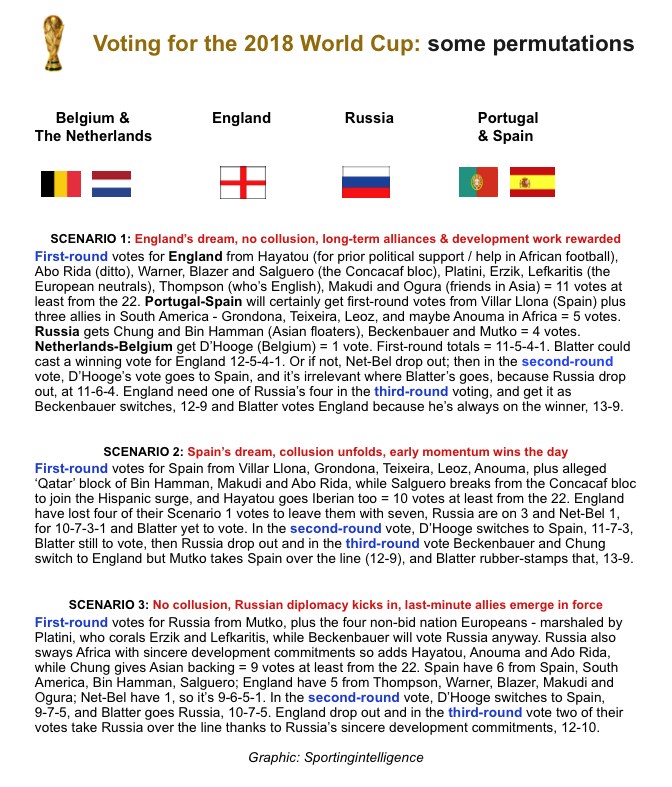- 0
By Nick Harris
18 November 2010
The battle for the right to stage the 2018 World Cup is wide open today as a race already full of twists and turns – with more to come – enters its final fortnight.
After an investigation by Fifa’s ethics committee in the wake of reports of corruption by the Sunday Times, two of the world governing body’s 24-man Executive Committee have been banned from football, and banned from voting on the hosts for the 2018 and 2022 World Cups.
Nigeria’s Amos Adamu and Tahiti’s Reynald Temarii have been banned from football respectively for three years and one year, and have also been fined. Background to their suspensions here.
Four other Fifa officials, all former ExCo members, have also been suspended from football activities. Full details of all the bans and fines can be found on Fifa’s website at the link here. The 2018 and 2022 votes will now involved 22 ExCo members, not 24.
England’s chances will not alter massively because of the effective expulsions of Adamu and Temarii. At one stage, the England 2018 bid team certainly believed it had a good chance of securing both men’s votes but sportingintelligence understands Temarii was always more inclined to vote for Spain in 2018 and Australia in 2022, while Adamu, courted over a long period, was always a loose cannon.
If the Sunday Times‘ (albeit undercover) concession from Adamu that he’d consider selling his vote for cash represented his true mindset, logic suggests he was in the market to sell his vote; and nobody has remotely suggested England have ever contemplated paying. Adamu was also caught on camera saying he’d pledged at least one vote for one tournament to a particular unnamed nation. To who, and why, is unlikely ever to be confirmed.
The ban announcements were made the day after the release of executive summaries of the evaluation visits by Fifa to the nations bidding for the tournaments.
Bidding for 2018 are Belgium-Netherlands jointly, England, Russia and Portugal-Spain jointly. Bidding for 2022 are Australia, Japan, Qatar, South Korea and the USA. A variety of news developments and PDFs can be found at the Fifa web page linked here.
A neutral view of the evaluations is that all bids have good points and drawbacks, England and Spain look generally strong but Russia’s bid isn’t massively flawed. The Belgium-Netherlands bid looks like an also-ran for 2018. For 2022, Qatar is clearly a hot and bothersome place but that alone won’t kill its chances while the others can all make claims. So the assessments really aren’t going to settle matters.
There has been plenty of speculation about whether the Sunday Times story and its fallout will hurt England’s bid, whether a forthcoming Panorama episode about historic Fifa corruption will do so, and whether Spain and Qatar will collude in voting on 2 December to help each other win the 2018 and 2022 events. (Fifa said today there was not “enough” evidence, as opposed to none, to act on any such collusion suspicions).
But as has consistently been the case, the vote on 2 December will still come down to a rich mix of factors: technical, political, economic, pragmatic, human. Every bid team will roll out its big guns. Certainly for 2018, the race looks wide open.
As our graphic below shows, there are three wholly plausible scenarios where each of England, Spain or Russia could win the race for 2018; and the reality is that the real outcome will be almost certainly be a mix’n’match blend of all three.
Can England win? Absolutely, with backing from Concacaf and Europe especially, neither of which are out the question.
Can Spain win? Absolutely, and if the alleged collusion between Spain and Qatar unfolds, they’ll start in an extremely strong position.
Can there be Spain-Qatar collusion but an England or Russia win anyway? Of course, because Spain might not get as many as 10 votes in the first round as outlined in Scenario 2 below, and England might get more than seven, and later drop-outs might go other ways than predicted.
Can Russia win? Absolutely. There is no reason in the world to think that Russia hasn’t been campaigning every bit as hard and as passionately and with as many legacy pledges as the next nation. If that earns them the votes of Africa and the floaters in Europe, then they’ll start strong and can win.
It’s wide open.
It could go any way.
For notes on the ExCo members mentioned in the graphic below, see Fifa’s website here.
.
Sportingintelligence home page
.







